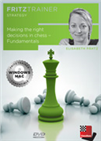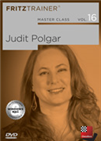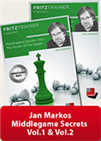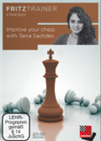Chess in education
It is a pleasure for us to introduce one of the most prominent figures in international educational chess, Rita Atkins. Ms Atkins is a Hungarian chess player, also known as Rita Zimmersmann, born on 25 December 1969 in the city of Székesfehérvár — at Christmas, when Santa Claus or Mikulas arrives and brings presents to the children.
From a very young age, Rita has been active in the chess community, achieving notable success in various chess tournaments, reaching the title of Woman International Master (WIM) and winning the Hungarian Women's Chess Championship in 1992. She has also been involved in teaching chess and mathematics to school children and youth. Rita has a significant presence in the chess world: she is currently the Secretary of the International Chess Federation's (FIDE) Chess in Education Commission.
Uvencio Blanco Hernández: Székesfehérvár is a city in central Hungary, whose name means "white castle" in Hungarian, and was a royal residence during the Middle Ages. It has a rich history, and was the coronation place of several Hungarian kings and queens. It also has a beautiful historic centre with baroque and classical buildings. Tell us about your childhood in this beautiful city.
Ms. Rita Atkins: There was no helicopter-parenting back then — children were given much freedom to explore the world independently from an early age. I remember, at the age of seven, my parents giving me the key to our flat that I was to wear on a chain around my neck so that it would not get lost. School kept me busy, but I was coming and going home as I pleased. My secondary school (called gimnázium in Hungarian) was in the heart of the city, a stone's throw away from Fő utca, a pedestrian-only street packed with shops and cafés. School finished at lunchtime, and I spent a significant portion of my afternoon socializing with classmates in these delightful cafés.
 In a total of 6 chapters, we look at the following aspects: the right decision based on tactical factors, decisions in exchanges and moves, complex and psychological decisions in longer games and in defence.
In a total of 6 chapters, we look at the following aspects: the right decision based on tactical factors, decisions in exchanges and moves, complex and psychological decisions in longer games and in defence.The surname Zimmersmann is of German origin and derives from the German word "Zimmermann", which is associated with Jewish heritage. Tell us about this family heritage.
I have often wondered about the origin of my surname, but I am not aware of any Jewish heritage in my family line. My family religion is mainly Roman Catholic, with ancestors from my father's side partly coming from Austria.
ELTE University of Budapest is a public research university. Founded in 1635, it is one of the largest and most prestigious public higher education institutions in the country. It is known for its excellence in research and education, and has been ranked in international higher education rankings. I understand that you obtained a degree in mathematics and physics education there. What skills and tools did you acquire at this university that would be useful for your future teaching career?
It was a vigorous, highly academic course in which during the five-year-long training a vast amount of subject matter was imparted on the would-be mathematics and physics teachers. Way more than necessary for secondary-school teaching, so I always felt confident delivering lessons even in highly academic institutions, such as St Paul's Girls' School in London.
Where our training lacked was pedagogy and teaching skills. We have learnt next to nothing about behavioural management, or at least this was how I felt when, in the first year of my teaching career, I found myself in front of a class of Irish adolescents in St Columba's College, Dublin. When the students realised that their teacher did not understand all that they were talking about, both my English language and my classroom management skills had to improve at lightning speed to survive.
You then completed your academic training at Imperial College; a prestigious public research university located in London, England, and founded by Prince Albert, consort of Queen Victoria. Imperial College is famous for its focus on science, engineering, medicine and business. You obtained your last academic degree at this institution: a master's degree in computer science. What encouraged you to enter this field of hard sciences?
I was a teacher in London during the Dotcom bubble in the late nineties. I saw my friends earning unbelievable sums of money in both finance and technology startup companies, and I wanted a piece of their pie. My dream was to become rich by creating my own internet startup. By the time I finished my master's degree in 2001, the Dotcom bubble was beginning to burst, and I realised that programming was not really my cup of tea after all: I simply was not a good hacker. I thoroughly enjoyed the theoretical part of computing, though, and I don’t regret having studied it.

Running a teacher-training workshop in Astana during the match for the World Chess Championship in April 2023
Rita, you have great patience and the ability to face challenges with determination. For example, at the time you obtained your undergraduate degree at ELTE University, you were already national champion of Hungary. How did you compartmentalize both responsibilities: studies and chess?
I prioritized: chess always came first. Whenever there was a good chess tournament in sight, I had to attend. Hungarian universities have two semesters followed by two exam periods, the first one in December and January, and the second one in May and June. Simply put, I was studying in these four months and was playing in chess tournaments during the rest of the year. Chess gave me the incredible opportunities to travel all around Europe effectively for free during my university years. I am very grateful for that.
Being a recognised Woman International Master, what is your opinion of the global chess movement in recent years?
The chess world has changed significantly since my active years in the sport. We had secret opening preparations hand-written in notebooks, stayed up at night analysing our adjourned games, and eagerly awaited the arrival of the latest Chess Informant to study masters at play. There was not a computer in sight. Now, with affordable computer-driven preparation, the path to success at the board is open to a much younger, and wider audience. It is wonderful, and if we manage to keep obeying the rules of fair play, then chess will continue to thrive.
What has your experience been like as a woman in the world of chess, a sport historically dominated by men?
I loved it — girls received so much attention. I cannot recall a single episode where I suffered because I was a female player. There were several tournament invitations that, given my playing strength, would never have come my way, had I been born male.
The process of women's empowerment is a political action. What is your view on the role of women in chess and how do you think more female participation in the sport can be encouraged?
Gender stereotypes are changing, but they are changing slowly. If an adolescent girl perceives that it is not cool for her to play chess, then she will underperform or stop playing altogether. Look at the strength of Kazakhstan's female team, for example. Give it another hundred years, and there will be just as many good female players as male ones.
There is another way we can improve on the gender balance right now: by introducing chess in the classroom. Teach every child chess at a certain point. Just the basics, the rules of chess, and provide many fun-filled lessons with minigames and educational chess exercises to enhance social and critical thinking skills. Girls will love it just as much as boys.
 In this video course, experts (Pelletier, Marin, Müller and Reeh) examine the games of Judit Polgar. Let them show you which openings Polgar chose to play, where her strength in middlegames were, or how she outplayed her opponents in the endgame.
In this video course, experts (Pelletier, Marin, Müller and Reeh) examine the games of Judit Polgar. Let them show you which openings Polgar chose to play, where her strength in middlegames were, or how she outplayed her opponents in the endgame.Also, in 1993, FIDE awarded you the title of Woman International Master. Were you faced with a choice: to continue your chess career in pursuit of the WGM title or to devote yourself to chess education and other related projects? Tell us about it.
Chess was always my hobby — I had never envisaged making it my career. Ironically it is exactly what happened: I am working full time now in Chess in Education (CIE).
Rita, you are a professional with determination, ambition and focus on achieving goals. In your opinion, what are the specific challenges that women face in today's Hungary, be it in the workplace, education or society?
Women in Hungary have access to the same level and type of education as men do. Therefore, they tend to have the same career ambitions as well. Society also puts a lot of pressure on women to reproduce: peculiar Hungarian "family laws" give families with many children — regardless of parental income — great financial subsidies. For example, women who bear four or more children do not have to pay any income tax at all. This would be all very well, if men were prepared to undertake a significant part of domestic duties.
While I met many stay-at-home or part-time employed happy daddies in the UK, I have yet to see a Hungarian male who is unapologetic and contented when he is at home looking after the kids, and he is the lesser earner than his wife.
Hungarian women face the great challenge of trying to have it all — find a work-life balance without professionally outshining their husbands.
You earned a degree in Mathematics and Physics, with teaching experience in England and Ireland. How do you use chess in promoting mathematical and cognitive skills in your students, and how important do you think the relationship between chess and mathematics is?
Problem-solving skills required to play chess and other strategy games efficiently are similar to those necessary in mathematics. Also, there are many mathematical problems that can be represented on the chessboard with or without the chess pieces. The mathematical characteristics of this constrained domain is also very rich: it gives rise to interesting problems in geometry, combinatorics, game theory and even computer programming. Hence, you can use the chessboard and the chess pieces as a tool in the teaching of mathematics.
Chess, the game itself, is inherently rich in mathematical elements: symmetry, balancing piece values, binary nature of the knight, winning tempo, zugzwang, triangulation, key squares in pawn endgames are a few examples. Children, while playing chess, are incidentally practising some mathematics too.

A chess workout on a giant board during the gala dinner at the Global Chess Festival in Budapest, October 2023
At the recent conference organised by the EDU Commission in America, I stated in my conclusions that "chess is a research domain whose application has generated multiple benefits in education; a fact that allows us to suggest its wider use, as a strategy to improve learning processes, and for the stimulation and development of cognitive, emotional and social skills, within the framework of the complex educational ecosystem of the 21st century". From your experience, could you add any other criteria to this vision?
You have summarised the idea of using chess as an educational tool very well. I would add that not only chess, as it is defined by its rules, that has this capability: minigames played with a subset of the chess pieces, other strategy games playable on the chessboard, and curriculum-linked exercises and investigations are also worthy items in the chess educator toolkit.
In addition to your teaching activity and as an organiser of conferences and teacher training seminars, you have started to develop written work. Tell us about your production in this field.
Most mathematical problems of the chessboard belong to the area of Recreational Mathematics. Many books have been written about the subject, but these are for university-level readers. My dream is to make some of these problems accessible to a younger audience, so I have started writing a book that discusses 64 such problems and games. The progress has been slow since I started my work at FIDE, but I am determined to finish it.
In the digital environment, you are the co-creator of an online tool called "LogiqBoard, the interactive online chessboard". What does it consist of, and what is its importance?
LogiqBoard is more than just an online chessboard, it is a teaching and learning platform, great for playing and problem-solving online and in classroom settings. Originally developed for drawing colourful board diagrams, interactive features were added to LogiqBoard to enhance online teacher training courses. You can get colourfully creative on LogiqBoard by populating it with chess pieces, counters of different shapes, mathematical symbols, smileys, flags, and many other icons. The latest addition is Worksheets for easy educational chess exercise sheet creation.
I understand that you are always committed to your work and enjoy taking on new challenges. You are currently Secretary of the FIDE Chess in Education Commission. Describe that work environment and what are your medium- and long-term goals?
We are mostly working from home and meeting colleagues, partners in education and other customers online. Our goal is to bring educational chess to many classrooms in the world. We facilitate this by training educators to become FIDE School Instructors in our freshly revised Preparation of Teachers Courses. While still covering the introduction of chess rules and development of basic chess skills through playing chess, also incorporated in the new course are chess-like minigames and exercises as well as important pedagogic elements, such as classroom management, differentiation techniques, safeguarding, and lesson planning.
In 2023 we trained 473 participants, 284 of whom became FIDE School Instructors. My medium-term goals are aligned with that of the FIDE EDU Commission: to make teacher training sustainable by preparing local lecturers, who then can train local teachers. Developing a course certification system is also a priority, so that we can recommend FIDE endorsed CIE courses to our customers. FIDE School Awards will be launched early next year to reward schools that have chess at the heart of their operations. My long-term goals are to build up a resource of CIE materials from around the world for people to see and download from our website, and to help bring chess to as many classrooms in the world as possible.
You have told us that your favourite website is Google DeepMind, "for its exquisite content". What is your opinion on the new trends in Artificial Intelligence that, according to some experts, could compromise the survival of society?
Everything is either good or bad depending on the people who use it and the purpose they are using it for. Artificial Intelligence could be of enormous benefit to humans in the development of individualised medical treatments, for example. In general, for gathering, analysing, classifying, and recreating large amounts of information, AI will be used everywhere. The best paid jobs of the future will be in AI query.
 Let us learn together how to find the best spot for the queen in the early middle�game, how to navigate this piece around the board, how to time the queen attack, how to decide whether to exchange it or not, and much more!
Let us learn together how to find the best spot for the queen in the early middle�game, how to navigate this piece around the board, how to time the queen attack, how to decide whether to exchange it or not, and much more!The FIDE Chess in Education Commission is currently playing with the idea of creating a CIE Chatbot and Avatar that could answer questions on CIE and also assist with classroom chess teaching.

FIDE EDU team at the Global Chess Festival in Budapest, October 2023. From left to right: Jerry Nash, Anzel Laubscher, Rita Atkins, and Boris Bruhn
You are reading "Rachel Again" by the famed Marian Keyes, an Irish novelist and non-fiction writer, best known for her work on women's literature. I understand that, "Rachel Again" is the long-awaited sequel to "Rachel's Holiday" and is part of the Walsh family series. Why have you been interested in this saga, written by a survivor? Do you feel any particular connection to it?
I have read over ten books by Marian Keyes and I have enjoyed every single one of them. Her characters are relatable and engaging; many suffer or suffered from addictions, and I can relate to that because I also have an addictive and obsessive nature. I can get hooked on many things: work, chess, people, but not really food or drink.
My mind often wonders during reading books, and I find myself not remembering what I have just read. This never happens with Marian Keyes books: her storytelling genius keeps me glued to the pages and fully focused.
You are a person who appreciates meaningful conversations with intelligent and kind people. Who has been the most intelligent person you have met, and has that person had any influence on your professional life?
I have met many intelligent people in my life, but if I must pick one, then I would choose someone who possesses both high cognitive and emotional intelligence: my friend of thirty years, GM David Robert Norwood. Dave is a genius at the chessboard — having finished his professional chess career a long time ago, he still makes the best moves effortlessly and with little opening preparation (see, for example, Wesley So vs David Norwood, Bunratty Chess Festival 2015). He is also a highly successful businessman, a talented writer, and a caring husband and father of two amazing children. He "has it all" because hurdles never broke his spirit, and it is his resilience that I admire, and I would like to imitate in my professional life.
Wesley So vs. David Norwood - Bunratty 2015
You have two children. Did they follow in their mother's footsteps in chess, science and education?
No, not really, but I am proud to have brought them up to be fiercely independent spirits. My daughter Maria, quoting her own words from the age of seven, never enjoyed winning games, only friendly games. So, chess was out of the question. (Well, competitive chess, but she would have thrived in my educational chess lessons, had I known about them back then.) Maria is a student of English literature and French at Edinburgh University. My son, Alan, played chess for a short while, but then opted for the violin instead. He is practising in Kaprun, Austria to become a fully qualified skiing instructor prior to beginning his studies in international law in Innsbruck.
Rita, you have told us that you practice fitness and hiking, as well as reading, theatre and going out to dinner. All very healthy. We have learned that our life is related to four basic pillars: health, work, relationships and spirituality. We are interested in your opinion on this concept.
The first three pillars are interrelated. People in stable relationships receive continuous emotional support, and thus tend to be healthier, more fulfilled, and generally perform better at work. I believe that spirituality underpins health, work, and relationships. By spirituality, I mean obtaining self-awareness. It is scary how little control we actually have over our lives: our decisions tend to be based on our emotions that stem from our environment, early childhood experiences, and family heritage. With self-awareness this can change: if you see through yourself, you will see through everyone, and then you have a chance to make the world a better place.
These ideas are extensively explored in the short but powerful book Awareness, written by Anthony de Mello, one of the most gifted spiritual teachers of the 20th century.
Finally, what makes you uncomfortable?
When I sense dishonesty and feel that someone tries to take advantage of good-natured people. Stupidity also aggravates me. "One thing that humbles me deeply is to see that human genius has its limits while human stupidity does not," a saying attributed to writer Alexandre Dumas.
 On this DVD, well-known Indian WGM Tania Sachdev shows you how to evaluate certain positions and then find the right concepts and plans on the basis of her own games.
On this DVD, well-known Indian WGM Tania Sachdev shows you how to evaluate certain positions and then find the right concepts and plans on the basis of her own games.
With Judit Polgar, conducting a chess and maths lesson at the Global Chess Festival in Budapest, October 2021
I would like to thank our EDU Commission colleague, Ms Rita Atkins, for her kindness in granting us this interview. We greatly appreciate the time she took to tell us about herself, her activities and her legacy for the growth of chess education. It has been a real pleasure for us to share this intelligent and sincere dialogue, just a day before her birthday!
In this video course, experts (Pelletier, Marin, Müller and Reeh) examine the games of Judit Polgar. Let them show you which openings Polgar chose to play, where her strength in middlegames were, or how she outplayed her opponents in the endgame.
Links
























